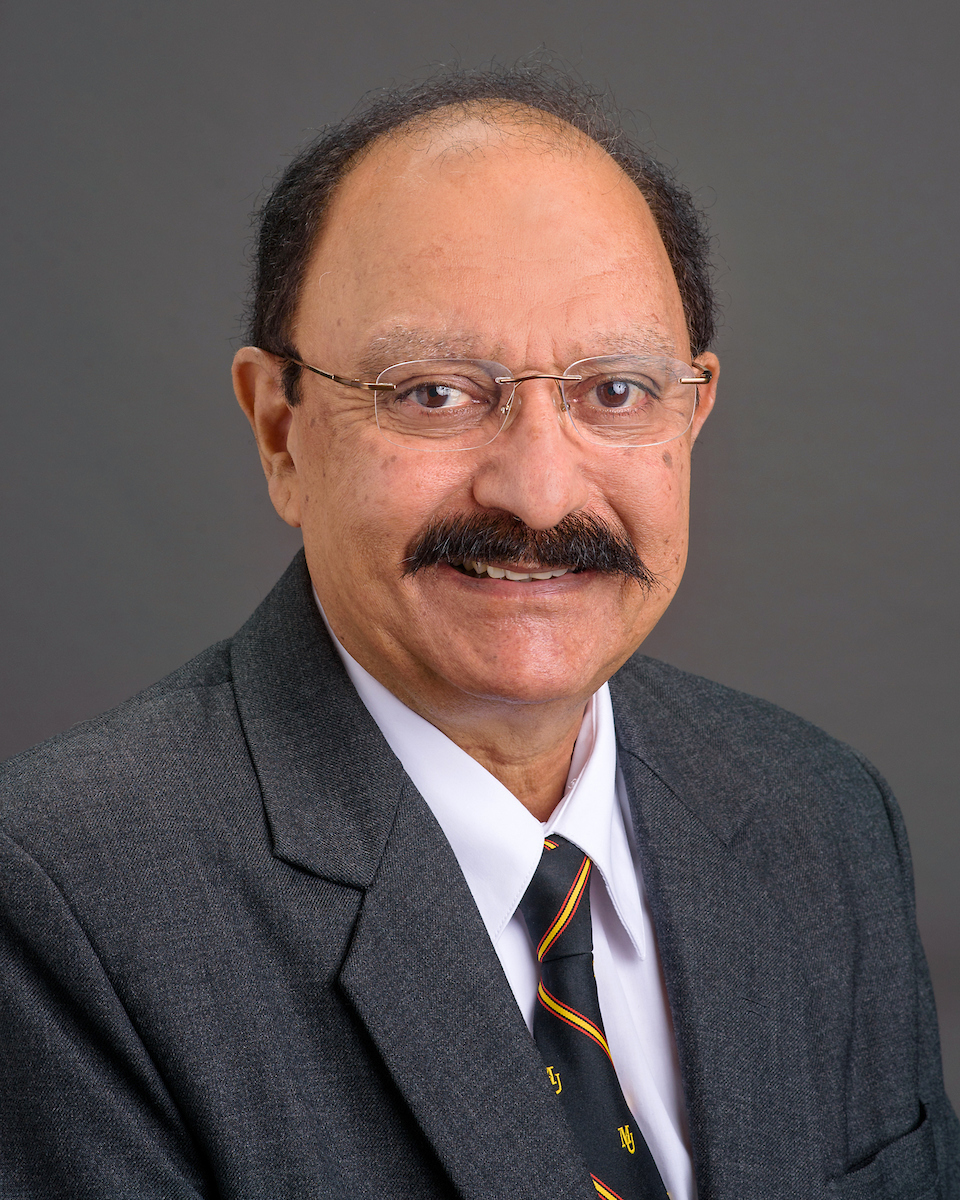Profile
The research in Dr. Shukla's laboratory deals with the pharmacology of transmembrane signaling, and epigenetic pathways in cellular responses and disease processes. Two areas have been targeted [a] blood platelet responses to platelet activating factor and thrombin with relevance to diabetes; and [b] alcohol-induced liver injury. The current focus is onto the epigenetic histone modifications by alcohol (ethanol) and its relevance to cellular damage in liver subjected to chronic and binge ethanol in vivo. Such studies are directly applicable to binge drinking, a clinical problem on the rise globally. Excessive alcohol consumption with a binge drinking pattern is emerging as a major public health concern. In the U.S., binge drinking is the most common form of excessive alcohol use. Alcohol causes liver injury that can progress to liver cirrhosis and cancer.
Dr. Shukla's research efforts have been supported since 1982 by research grant awards from NIH (K04, R21, R01), American Heart Association, and from other agencies, as a principal investigator. These projects have consistently incorporated interactions with clinical faculty with a translational perspective. The laboratory has several years of expertise in cellular and molecular pharmacology related to liver studies using both in vitro and in vivo animal (rat and mice) models. Dr. Shukla's laboratory uses a variety of methods including: cell culture; in vivo (animal studies); receptor binding; cell signaling methodologies; protein kinase assays; post-translational histone modifications; blood platelet aggregation & secretion; western blotting; immuno-fluorescence detection, confocal microscopy; real time PCR; functional-proteomics; gene and protein array; CHIP assay; transcription assays, and various other pharmacological techniques.
Academic Information
Office
1 Hospital Drive
M526 Medical Sciences Building
Columbia, MO 65212
United States
Research Interests
- Epigenetic and cell signaling effects of ethanol on liver
- Platelets and vascular remodeling
Education & Training
Fellowship
University of Birmingham (England)
Post-Graduate School
1980-1982 Postdoctoral research trainin,g University of Texas Health Science Center, San Antonio, Texas
1977 PhD (Biochemistry), University of Liverpool, England
1976-1980 Postdoctoral research training, University of Birmingham, England
1970 MSc (Gold Medalist) Banaras Hindu University, India
Awards & Honors
- State Merit Scholarship (India) 1964-1966
- Atomic Energy Commission Scholarship (India) 1968-1970
- Banaras Hindu University Gold Medalist (India) 1970
- Council of Scientific and Industrial Research Fellowship (India) 1971
- National Scholarship (India) 1973-1976
- Science Research Council Fellowship, England 1976-1979
- American Heart Association, Texas Affiliate, Grant-In-Aid Awardee (1981-84)
- NIH Research Career Development Award (RCDA) 1989-1994
- Award for Excellence in Medical Student Education, Univ. of Missouri School of Medicine, 1999
- Awarded ‘Order of Socrates II’ for contribution to Medical Education, 2008
- Awarded Margaret Proctor Mulligan Endowed Professorship, 2008
Memberships
- American Society of Pharmacology & Experimental Therapeutics; Research Society on Alcoholism
- Served as regular (chartered) member of 4 different NIH study sections
Publications
- Shukla SD, Restrepo R, Aroor AR, Liu X, Lim RW, Franke JD, Ford DA and Korthuis RJ.
Binge alcohol is more injurious to liver in female than male rats: histophathological, pharmacological, and epigenetic profiles.
J. Pharmacol & Exp Ther 370, 390-398, 2019. - White AA, Tapert S, and Shukla SD.
Binge Drinking: Editor’s note.
Alcohol Research: Current Reviews 39 (1), 1-3, 2018. - Restrepo RJ, Lim RW, Korthuis RJ and Shukla SD.
Binge alcohol alters PNPLA3 levels in liver through epigenetic mechanism involving histone H3 acetylation.
Alcohol 60, 77-82, 2017. - Szary N, Rector RS, Uptergrove GM, Ridenhour S, Shukla SD, Thyfault JP, Koch LG, Britton SL and Ibdah JA.
High intrinsic aerobic capacity protects against ethanol-induced hepatic injury and metabolic dysfunction: study using inbred high-capacity runner rat model.
Biomolecules 5, 3295-3308, 2015. - Shukla SD, Aroor AR, Restrepo R, Kharbanda KK and Ibdah JA.
In vivo acute on chronic ethanol effects in liver: A mouse model exhibiting exacerbated injury, altered metabolic & epigenetic responses.
Biomolecules, 5, 3280-3294, 2015. - Shukla SD, Restrepo RJ, Fish P, Lim RW and Ibdah JA.
Different mechanisms for histone acetylation by ethanol and its metabolite acetate in rat primary hepatocytes.
J. Pharm & Exp Ther 354, 18-23, 2015.
Editorial Responsibilities
- Editor of the book on "Platelet Activating Factor Receptor: Signal Mechanisms and Molecular Biology," CRC Press, 1993.
- Editorial Board Member, World Journal of Gastroenterology, 2005-present.
- Editorial Board Member, J. Pharmacology & Exp. Therapeutics 2008-2017.
- Editorial Board Member, World J. Hepatology, 2009-present.
- Editorial Board Member: Alcohol Research: Current Reviews (NIH Journal), 2009-2018.
- Co-Editor: Alcohol Research: Critical Reviews, Special issue on Epigenetics Vol 35(1), 2013. (A NIH publication)
- Co-Editor: Alcohol Research: Current Reviews: Special issue on Binge Drinking, Vol 39 (1), 2018. (A NIH publication)
- Editorial Board Member, Biomolecules (2021-present).


